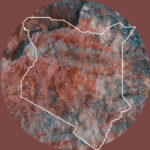Visualizing
the Virus
Building collaborative relations and data
Research Data Share KE
Just as cities around the world began to shelter in place with the global spread of COVID-19, I and other researchers who work in Nairobi, Kenya gathered virtually for our first Research Data KE working group meeting on March 19, 2020. The meeting was attended by a sub-group of attendees who had attended a public workshop entitled “Archiving Kenya’s Past and Futures” held in late 2019. During the first call, we found we shared an interest in pursuing better, more ethical, regenerative ways to make research. Meeting participants decided to assemble virtually every second Thursday of the month to discuss issues related to research and research data in Kenya. Over two years later, we continue to hold this meeting monthly. Holding these steady monthly calls has been an important way to maintain our collective over time.
Given our interest in exploring questions of ownership, responsibility, ethics, and technologies of archiving research data, one of the first projects that the group experimented with was developing a COVID-19 archive of news and public discourse about the COVID19 epidemic in/from/about Kenya. Group members identified and archived artifacts – found in traditional media, social media, or captured by members themselves via photographs – reflecting the diverse experiences of COVID-19 in Kenya. The work flowed in bursts and spurts, but our group held together through our monthly conversations, which went on regardless of what had been done on the technical platform. Find the group’s early COVID-19 archive here.
A key insight gained from our work together has been the difference between thinking about data as relational rather than as property. The recordings of our working group meetings, for example, are not “data” to be used just for my own project; they are records of our conversations and an attempt to build collective public memory about what we are trying to figure out and how we are getting there. As relational data, the data produced by our group provides building blocks for us to practice careful listening to each other and ourselves and iterative (self)-observations. The data are not owned by anyone but are a collective resource (symbolized by a Creative Commons license).
This emerging conceptualization of data as relational draws from broad work on data and ethics influenced by activist, indigenous, and feminist STS scholars like Abeba Birhane, and those working on algorithmic injustice; Tahu Kukutai and others working in indigenous data sovereignty; Max Liboiron and their team working on anticolonial Science. These and other scholars have critiqued dominant scientific practices and pushed back against treatment of data as if they are unitary, stable objects “owned” by any given researcher/author. As open data becomes increasingly common and expected, viewing the sharing of data not as a binary (shared or not shared) and rather as falling across a spectrum (how much and what would I share with who) appears to be a more productive and practical way to begin to practice more open approaches to scientific knowledge production. It also recognizes the entangled systems of relations that data both fosters and is fostered by.
Today, our conversations in the RDS Working Group have largely shifted away from COVID-19 to return to topics that feel more pressing in Nairobi – upcoming elections, nearly unbearable economic pressures, and of course, as researchers, our initial concerns related to extroverted scientific systems (Hountondji 1990, 1997). The shifts and changes in our discussions over time reflect how collaboration as a process is ongoing and can have different valences over time, sometimes tightly coupled and at other periods, looser. For the time being, we continue to use the working group mechanism and monthly synchronous calls to hold space to figure out the kinds of research spaces we need moving forward, a lively and active space for practicing and experimentation, using data as an intermediary object for discussion and sharing of multiple perspectives.
Edited by Faiza Masood.
